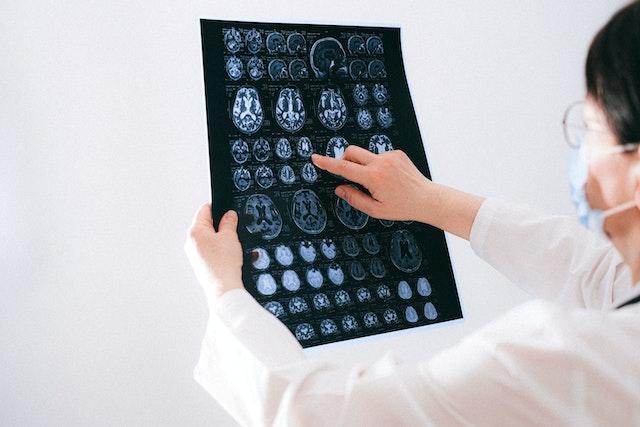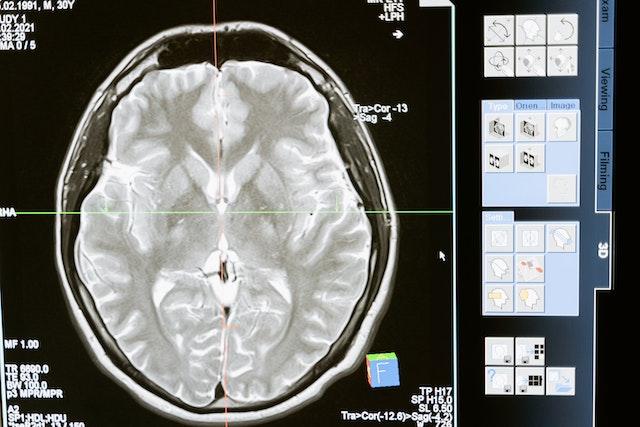
The amygdala is a set of nuclei situated deep within the temporal lobe that gives it its almond-shaped appearance.
The name amygdala is derived from Latin and translates to “almond,” owing to one of the amygdalae’s most distinctive nuclei having an almond-like form.
There are two amygdalae—one in each cerebral hemisphere—though we commonly refer to it as though there was only one.
The amygdala is important for processing emotions, especially fear and aggression. It also plays a role in memory, decision-making, and motivation.
Damage to the amygdala can lead to deficits in these areas.
What is the main function of the amygdala?
The amygdala is best known for its role in processing emotions, especially fear, and aggression.
- Fear is an emotion that helps us deal with potentially dangerous situations. It motivates us to take action to protect ourselves from harm.
- Aggression is a response that allows us to defend ourselves or our friends and family from danger.
The amygdala is important for these emotions because it helps us to identify and respond to threats. It does this by sending signals to the parts of the brain that control our fight-or-flight response.
Read also: What Does It Mean to Be Neurodivergent
What happens if the amygdala is damaged?
There are many effects if the amygdala is damaged. It includes
It can lead to deficits in fear and aggression
In one study, patients with damage to the amygdala were more likely to approach rather than avoid snakes and spiders, even when they were explicitly told that these creatures were dangerous.
Another study found that patients with amygdala damage were no more likely to show signs of fear or distress when shown upsetting images, such as scenes of violence than controls who did not have any damage to the amygdala.
These findings suggest that the amygdala is essential for mediating our fear response and that damage to this structure can have profound effects on our emotions and behavior.
It leads to deficits in memory
The amygdala is also important for memory. Studies have shown that patients with damage to the amygdala are more likely to have difficulty remembering emotional events, such as traumatic experiences.
This is because the amygdala plays a role in encoding and storing emotional memories.
It can lead to deficits in decision-making
The amygdala is also involved in decision-making. Studies have shown that patients with damage to the amygdala are more likely to make impulsive decisions and are less likely to consider the consequences of their actions.
It can lead to deficits in motivation
The amygdala is also involved in motivation. Studies have shown that patients with damage to the amygdala are more likely to be apathetic and show less interest in their surroundings.
All of these findings suggest that the amygdala is essential for many different aspects of our behavior and that damage to this structure can have profound effects on our ability to function properly.
Read also: How Does Bipolar Disorder Affect The Brain
How does the amygdala get damaged?

There are many ways in which the amygdala can be damaged.
Traumatic brain injury
Traumatic brain injury (TBI) is a leading cause of amygdala damage. TBI occurs when a person experiences a blow to the head, such as a fall or car accident.
When the brain is injured, the cells in the amygdala are often damaged as well. This can lead to problems with mood, memory, and anxiety.
Treatment for TBI-related amygdala damage typically includes therapy and medication.
In some cases, surgery may also be necessary. With treatment, many people are able to recover from TBI and live relatively normal lives.
Stroke
Another common cause of amygdala damage is stroke. This occurs when blood flow to the amygdala is cut off, typically due to a blockage in an artery.
This can damage or kill the cells in the amygdala. Treatment for stroke-related amygdala damage typically includes therapy and medication.
In some cases, surgery may also be necessary. With treatment, many people are able to recover from stroke and live relatively normal lives.
Alzheimer’s disease
Alzheimer’s disease is a degenerative brain disorder that often leads to amygdala damage. In Alzheimer’s disease, the cells in the amygdala begin to die, which can lead to problems with memory, mood, and anxiety.
There is no cure for Alzheimer’s disease, but there are treatments available that can help slow the progression of the disease and improve symptoms.
Encephalitis
Encephalitis is an inflammation of the brain that can lead to damage to the amygdala. Encephalitis is often caused by a virus, such as the flu or herpes simplex virus.
Treatment for encephalitis typically includes therapy and medication. In some cases, surgery may also be necessary. With treatment, many people are able to recover from encephalitis and live relatively normal lives.
Temporal lobe epilepsy
Temporal lobe epilepsy is a type of epilepsy that often leads to damage to the amygdala. In temporal lobe epilepsy, seizures originate in the temporal lobe of the brain, which includes the amygdala.
Treatment for temporal lobe epilepsy typically includes medication and, in some cases, surgery. With treatment, many people are able to control their seizures and live relatively normal lives.
As you can see, there are many different ways in which the amygdala can be damaged.
If you or someone you know has damage to the amygdala, it is important to seek treatment as soon as possible. With treatment, many people are able to recover and live relatively normal lives.
Read also: Does ADHD Affect Memory
Final thought
The amygdala is a small but important structure in the brain. It is involved in many different aspects of our behavior, including decision-making, motivation, and memory.
Damage to the amygdala can have profound effects on our ability to function properly.
There are many different ways in which the amygdala can be damaged, such as by stroke, Alzheimer’s disease, or temporal lobe epilepsy.
If you or someone you know has damage to the amygdala, it is important to seek treatment as soon as possible. With treatment, many people are able to recover and live relatively normal lives.



